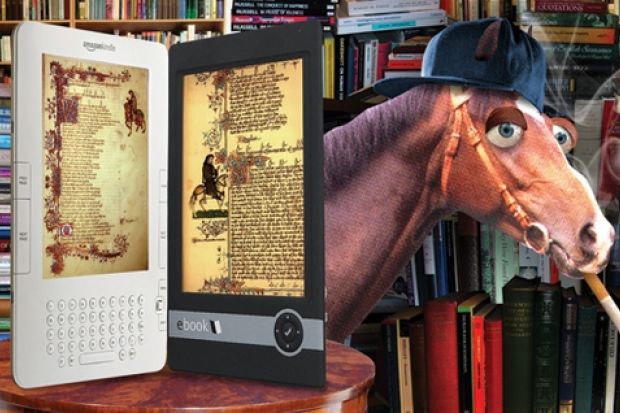Let's hear no more about Kindle, Amazon's "Revolutionary Wireless Reading Device". It looks like a roof slate. A moment of carelessness and it could be used to fix a leak. So what if it can store 3,500 books? Who is going to read that many in a lifetime? Who can read that many? That's about 46 books a year, providing you start as soon as you pop into the world and carry on until you pop out of it.
And what if you leave it on a train? There goes your entire library. No, give me the hardback or the paperback. The one gives you gravitas, the other establishes your democratic credentials.
You can also write in the margins. Try doing that on a Kindle. In the 14th century they emblazoned their margins: great drapes of colour drawn back to let the words shine forth. Open a medieval parchment and you stare into the heart of light. Switch on a Kindle and you get 16 shades of grey. The Beauty of Books: Medieval Masterpieces (BBC Four, Monday 14 February, 8.30pm) was a joy.
The Luttrell Psalter and The Canterbury Tales were examined in turn. Adjectives like "earthy", "whimsical" and "grotesque" abounded. The Psalter, bustling with images of daily life, was commissioned by a landowner, Geoffrey Luttrell. He tried to get on the right of side of God by being portrayed with Truth and Mercy. Dr Carolyne Larrington of St John's College, Oxford ticked off the illustrator who gave Chaucer's clerk a bow ("quite inappropriate") before reading a racy excerpt from The Merchant's Tale in a monotone. Quite inappropriate.
The talking heads were every bit as various as the scenes depicted around the manuscripts themselves. At one extreme was Dr Alixe Bovey from the University of Kent. She was so laid back they had to prop her against a pillar to keep her upright. At the other was Dr Christopher de Hamel of Corpus Christi College, Cambridge, who compared the Psalter to Footballers' Wives. His excitement at being allowed to make such outrageous parallels proved too much and he didn't last the half hour.
Stephen Bayley said: "The book is still the most intelligent, interactive data retrieval system which has been devised - and you can take it into the bath." This makes it sound as if the past is no different from the present, that reading has always been a form of "data retrieval". But such phrases reflect our own view of reading, not those of the medieval period. Advances in technology don't just alter the shape and feel of the book, they change the way we speak about it too, which, in turn, changes our relationship to it. And not necessarily for the better. Anyone who had a true sense of the value of the Luttrell Psalter, for instance, wouldn't dream of taking it into the bath with him. Or her.
Such discussions are unlikely to bother the kids at Impact (Teen Horse Whisperers, Channel 4, Friday 25 February, 7.30pm). Is there no getting away from that word? It's a school for students in Liverpool who have been removed from mainstream education because they have difficulty controlling their behaviour. "John, can you put your lighter away please?" asks the teacher. John stops trying to set fire to his baseball cap and glares at her. She turns to the class. "You need to develop what's called personal, learning and thinking skills."
Where better than Bernie's pony sanctuary? The animals have something in common with the children: both have been treated badly. Anneliese was not beaten with planks nor crushed between two gates and tagged, but she did look after her alcoholic mother and siblings before being taken into care. Bernie grew up on a council estate. "What's the word when everything is run down and there's no money?" She couldn't remember. No one could. Anyway, growing up there "was quite tough".
She explained to the huddle of teenagers that the horses didn't behave badly after their first day at the sanctuary. Why was that, she asked. No answer. "It's because they're allowed to be horses." You waited for the inevitable retort. It didn't come. Perhaps they were wondering if Bernie was drawing an analogy.
She believes that, by becoming aware of the horses' actions, the youngsters will become more aware of their own. Horses, she tells them, are able to pick up what people are feeling and this helps the likes of John to get in touch with his emotions. At first he backed away from his pony but, encouraged by Bernie, he was soon brushing it down, feeding it apples and even leading it round the paddock. When she told him how proud she was of his achievement, he ran off. He wasn't used to praise.
Government cuts mean Impact may have to close. And then what will happen to kids like John? There should be kindness as well as Kindles.
Register to continue
Why register?
- Registration is free and only takes a moment
- Once registered, you can read 3 articles a month
- Sign up for our newsletter
Subscribe
Or subscribe for unlimited access to:
- Unlimited access to news, views, insights & reviews
- Digital editions
- Digital access to THE’s university and college rankings analysis
Already registered or a current subscriber? Login
